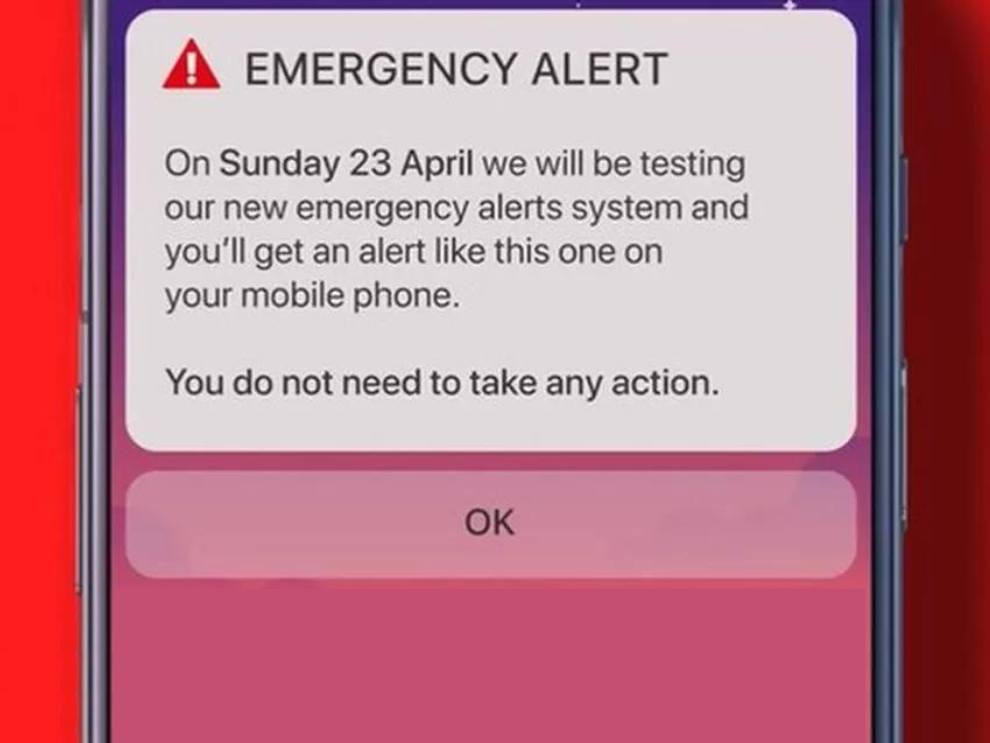
Beware of emergency alert scammers: Tips to stay safe
- The real alert will not require you to take any action.
- Fake alerts may include links, request personal information or ask you to download apps.

The UK government is rolling out its new Emergency Alerts system, aiming to keep people safe and informed during future times of crisis. This new system will send an alert to millions of mobile phones, and the government will test it on 23 April at 3 pm.
However, as scammers are always looking for a way to exploit people during times of vulnerability, this new alert system is expected to be no exception.

Lisa Webb, Which? Scams Expert said: “Scammers will use any hook they can to try and steal money and personal information from victims, and unfortunately, the government’s upcoming nationwide test of its new Emergency Alerts system will be no exception.”
“It’s vital anyone who receives the official test alert is aware that no action is required. If you are asked to download an app or provide information, this will likely be an unscrupulous fraudster trying to trick you and should be ignored at all costs.
“The government has said it will be including a website link with more information about the alerts in the message it sends out, but it’s worth considering looking this information up separately through the official government website rather than risking clicking on lookalike links from fraudsters.
Source of quote
Avoiding scams is crucial to keep your personal information and business data safe. So, in this blog post, we will discuss some tips to stay safe and avoid scammers exploiting the Emergency Alert system is activated.
The following tips are helpful and will help keep you alert to potential fraudsters and scammers looking to exploit the emergency alert system.
Don’t share personal information
Scammers may impersonate the government or the emergency alert service provider to collect personal information such as credit card details, passwords, or social security numbers.
The government will never ask for this information through the Emergency Alert system. So, if you receive a message asking for personal information, do not respond.
Do not click on unfamiliar links
A common method scammers use to exploit people is through links embedded in messages or emails. These links may lead to fake websites that try to steal personal information or money.
There will be no link to click on in the real alert, so be highly suspicious of any alert containing a link.
Always be cautious when clicking on links in messages or emails, and always check the URL before entering personal information.
Be wary of phishing scams.
Since urgent-sounding messages are a typical tactic used in phishing, the emergency alert system is a perfect delivery system for creating a sense of panic. The recipient does not take usual precautions before divulging personal information.
Always be wary when you receive unsolicited messages or phone calls and do not trust them without first confirming the source.
Beware of fake apps
One of the most common ways scammers exploit people is through fake apps. An innocent-seeming app may actually create alerts similar to the official Emergency Alert notification system. Tricking you into believing any future personal information they request is genuine.
When installing an app, always check the developer’s name and the number of downloads. Also, consider reading the reviews before downloading it.
Report suspicious activity
Finally, if you suspect that a scam artist has targeted you, report it immediately to the relevant authorities.
You can report any scam calls or texts you receive to 7726. If you, a friend, a family member or an employee fall victim to a scam, then contact your bank immediately and report it to Action Fraud.
Which devices will receive the alerts?
The alerts will work on all 4G and 5G phone networks in the UK and on devices with the following software:
- iPhones running iOS 14.5 or later
- phones and tablets running Android 11 or later
There is no need to register or download an application.
But older “non-smart” phones will be unable to receive the alerts, and nor will devices that are turned off or on aeroplane mode. The alert will sound on phones on silent mode.
The government has said the emergency services will have other ways to notify those without a compatible device.
The alerts will not replace local news, radio or social media.
Conclusion:
The UK government’s Emergency Alert system is designed to keep people informed and safe during times of crisis. However, scammers may take advantage of this new system to exploit people.
By following these tips, you can stay safe and avoid scammers when the Emergency Alert is activated.
Remember always to be cautious when you receive unsolicited messages or phone calls, and report any suspicious activity to the relevant authorities.
Stay alert, stay safe!
If you’re concerned about the impact of cyber security on your business, then contact The One Point to help you completely secure your business data.
